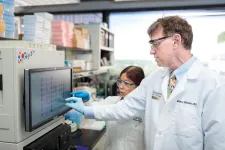(Press-News.org) A small clinical trial shows promising results for patients with triple-negative breast cancer who received an investigational vaccine designed to prevent recurrence of tumors. Conducted at Washington University School of Medicine in St. Louis with a therapy designed by WashU Medicine researchers, the trial is the first to report results for this type of vaccine — known as a neoantigen DNA vaccine — for breast cancer patients.
The study, which found the vaccine to be well-tolerated and to stimulate the immune system, is available Nov. 14 in the journal Genome Medicine.
The phase I clinical trial — conducted at Siteman Cancer Center, based at Barnes-Jewish Hospital and WashU Medicine — involved 18 patients diagnosed with triple-negative breast cancer that was not metastatic, meaning it had not spread to other organs. Each patient received the standard of care and three doses of a personalized vaccine tailored to home in on key mutations in their specific tumor and train immune cells to recognize and attack any cells bearing these mutations.
Following treatment, 14 of 18 patients showed immune responses to the vaccine and, after three years, 16 patients remained cancer-free. While the early-stage trial was designed to evaluate safety of the vaccine and did not include a control group to determine efficacy, the researchers analyzed historical data from patients with triple-negative breast cancer treated with the standard of care only. In that group, on average, about half of patients remained cancer-free at three years post-treatment.
“These results were better than we expected,” said senior author William E. Gillanders, MD, the Mary Culver Distinguished Professor of Surgery at WashU Medicine who treats patients at Siteman. “Obviously, it’s not a perfect comparison, and we acknowledge the limitations of this type of analysis, but we are continuing to pursue this vaccine strategy and have ongoing randomized controlled trials that do make a direct comparison between the standard of care plus a vaccine, versus standard of care alone. We are encouraged by what we’re seeing with these patients so far.”
Triple-negative breast cancer is an aggressive tumor type that grows even in the absence of the hormonal fuel that drives growth of other types of breast cancer. To date, triple-negative breast cancer has no targeted therapies and is usually treated with traditional approaches that include surgery, chemotherapy and radiation therapy. For reasons that scientists are still investigating, this tumor tends to be more common among African American patients diagnosed with breast cancer. In this trial, one-third of the participants (six of 18) were African American.
For this trial, patients with triple-negative breast cancer who still had evidence of a tumor remaining after a first round of chemotherapy were eligible to participate. Such patients are at high risk of cancer recurrence even after the remaining tumor is surgically removed. After surgical removal, the research team analyzed and compared the tumor tissue with the same patient’s healthy tissue to find unique genetic mutations in the cancer cells. Such mutations in a patient’s cancer cells alter the proteins only in the tumor, making it possible to train the immune system to go after the altered proteins and leave healthy tissues alone.
Using software they designed, the researchers selected altered proteins — called neoantigens — that were made by the patients’ tumors and that were identified as most likely to trigger a strong immune response. On average, each patient’s vaccine contained 11 neoantigens (ranging from a minimum of four to a maximum of 20) specific to their tumor.
The software development was led by computational biologists Obi Griffith, PhD, a professor of medicine, and Malachi Griffith, PhD, an associate professor of medicine, both in the Division of Oncology at WashU Medicine. A related paper published simultaneously in the same journal describes the software tools they developed. One of their goals is to make these computational resources widely accessible to cancer researchers and clinicians worldwide.
“We hope to promote the use of this software for the design of cancer vaccines,” Malachi Griffith said. “These are complex algorithms, but in general, the software takes in a list of mutations and interprets them in the context of their potential to be good neoantigen candidates. The tools rank the possible neoantigens based on our current knowledge of what matters in stimulating the immune system to attack cancer cells. These software tools were developed with support from the National Cancer Institute, and they have an open license that makes them broadly available for both academic and commercial uses.”
Several studies of cancer vaccines are ongoing at Siteman. Vaccines for all of these trials are made in a WashU Medicine facility that meets the good manufacturing practice (GMP) requirements set by the Food and Drug Administration. In some of the vaccine clinical trials for breast cancer patients, personalized vaccines are being investigated in combination with immunotherapies called checkpoint inhibitors that boost the action of T cells.
“We are excited about the promise of these neoantigen vaccines,” Gillanders said. “We are hopeful that we will be able to bring more and more of this type of vaccine technology to our patients and help improve treatment outcomes in patients with aggressive cancers.”
###
Zhang X, Goedegebuure P, Chen MY, Mishra R, Zhang F, Yu YY, Singhal K, Li L, Gao F, Myers NB, Vickery T, Hundal J, McLellan MD, Sturmoski MA, Kim SW, Chen I, Davidson JT, Sankpal NV, Myles S, Suresh R, Ma CX, Foluso A, Wang-Gillam A, Davies S, Hagemann IS, Mardis ER, Griffith O, Griffith M, Miller CA, Hansen TH, Fleming TP, Schreiber RD, Gillanders WE. Neoantigen DNA vaccines are safe, feasible, and induce neoantigen-specific immune responses in triple-negative breast cancer patients. Genome Medicine. Nov. 14, 2024.
This work was supported by Susan G. Komen for the Cure, grant number KG111025; the Alvin J. Siteman Cancer Center/Siteman Investment Program grant 4035; the National Institutes of Health (NIH), grant numbers R01 CA240983, P30‐CA091842, U01 CA248235 and T32 CA009621; the Foundation for Barnes‐Jewish Hospital; and the Centene Corporation contract P19‐00559 B101 for the Washington University‐Centene ARCH Personalized Medicine Initiative.
Xia H, Hoang MH, Schmidt E, Kiwala S, McMichael J, Skidmore ZL, Fisk B, Song JJ, Hundal J, Mooney T, Walker JR, Goedegebuure SP, Miller CA, Gillanders WE, Griffith OL, Griffith M. pVACview: an interactive visualization tool for efficient neoantigen prioritization and selection. Genome Medicine. Nov. 14, 2024.
This work was supported by the National Human Genome Research Institute (NHGRI) of the National Institutes of Health (NIH), grant number R00HG007940; the National Cancer Institute (NCI) of the NIH, grant number U01CA248235; the V Foundation for Cancer Research, award number V2018-007; the Centene Corporation contract P19-00559 for the Washington University-Centene ARCH Personalized Medicine Initiative; and the Goldberg Family Foundation.
This content is solely the responsibility of the authors and does not necessarily represent the official views of the NIH.
About Washington University School of Medicine
WashU Medicine is a global leader in academic medicine, including biomedical research, patient care and educational programs with 2,900 faculty. Its National Institutes of Health (NIH) research funding portfolio is the second largest among U.S. medical schools and has grown 56% in the last seven years. Together with institutional investment, WashU Medicine commits well over $1 billion annually to basic and clinical research innovation and training. Its faculty practice is consistently within the top five in the country, with more than 1,900 faculty physicians practicing at 130 locations and who are also the medical staffs of Barnes-Jewish and St. Louis Children’s hospitals of BJC HealthCare. WashU Medicine has a storied history in MD/PhD training, recently dedicated $100 million to scholarships and curriculum renewal for its medical students, and is home to top-notch training programs in every medical subspecialty as well as physical therapy, occupational therapy, and audiology and communications sciences.
END
Vaccine shows promise against aggressive breast cancer
Clinical trial targeted recurrence of hard-to-treat triple-negative breast cancer
2024-11-14
ELSE PRESS RELEASES FROM THIS DATE:
Adverse events affect over 1 in 3 surgery patients, US study finds
2024-11-14
Adverse events affect more than a third (38%) of adults undergoing surgery, finds a study of admissions to 11 hospitals in the US state of Massachusetts, published by The BMJ today.
Of the 1009 admissions analysed, nearly half were classified as major (resulting in serious, life threatening or fatal harm) and the majority were considered as potentially preventable.
Although this study may not fully represent hospitals at large, the findings show that “adverse events remain widespread in contemporary ...
Outsourcing adult social care has contributed to England’s care crisis, argue experts
2024-11-14
Outsourcing adult social care services in England to the private sector since the 1980s has led to worse care and should be rolled back, argue experts in The BMJ today.
Benjamin Goodair at the Blavatnik School of Government, University of Oxford and colleagues suggest that removing the profit motive would help improve quality and reduce inequities.
Social care, sometimes referred to as community, residential, or personalised care, for older people and people with physical and mental disabilities is facing record demand but performing worse than any time in recent history, they explain.
One contributor to this, they say, is the outsourcing of care provision from the ...
The Lancet: Over 800 million adults living with diabetes, more than half not receiving treatment, global study suggests
2024-11-14
**Correction**
A subheading in the press release sent yesterday was incorrect - the line 'Global rates of diabetes doubled over the last two decades' should be ''Global rates of diabetes doubled over the last three decades'.
The subheading and two further occurrences of the same mistake have been corrected in the copy below (in yellow). The rest of the press release remains unchanged.
We sincerely apologise for any inconvenience caused,
The Lancet press office (pressoffice@lancet.com).
The ...
New therapeutic approach for severe COVID-19: faster recovery and reduction in mortality
2024-11-14
A new clinical study shows that an inhibitor of Fas ligand (FasL), also called CD95 ligand (CD95L), led to a faster recovery of COVID-19 patients and reduced mortality. On average, it took eight days to recover for patients who received asunercept, a biotherapeutic FasL inhibitor, compared to 13 days in the control group. In addition, mortality was decreased by about 20 per cent. The study ‘Efficacy and safety of asunercept, a CD95L-selective inhibitor, in hospitalised patients with moderate-to-severe COVID-19: ASUNCTIS, a multicentre, randomised, open-label, controlled, phase 2 trial’ ...
Plugged wells and reduced injection lower induced earthquake rates in Oklahoma
2024-11-14
Wastewater injection resulting from oil and gas production in Oklahoma caused a dramatic rise in seismic activity in the state between 2009 and 2015. But regulatory efforts to backfill some injection wells with cement and reduce injection volumes have been effective in lowering the state’s induced earthquake rate, according to a new study in The Seismic Record.
The study by Robert Skoumal of the U.S. Geological Survey and colleagues lends further support to the idea that reducing the depth of wastewater injection can decrease seismic activity—a finding that ...
Yin selected as a 2024 American Society of Agronomy Fellow
2024-11-14
Frank Yin, agronomy researcher in the University of Tennessee Department of Plant Sciences, has been selected as a 2024 American Society of Agronomy (ASA) Fellow.
The honor was awarded as a result of Yin’s more than 35 years of research contributions to institutions across the world, including 16 years at the University of Tennessee Institute of Agriculture (UTIA). Yin was recognized for the Fellowship at the national meeting of ASA in San Antonio, Texas in November.
“I am humbled and honored to receive this distinction, but above all I am ...
Long Covid could cost the economy billions every year
2024-11-14
Working days lost to long Covid could be costing the economy billions of pounds every year as patients struggle to cope with symptoms and return to work, finds a new study led by UCL researchers.
The research, published in BMJ Open and funded by the National Institute for Health and Care Research (NIHR), examined the impact of long Covid on 4,087 patients who were referred to a long Covid clinic and registered in the Living With Covid Recovery (LWCR) programme between August 2020 and August 2022.
As part of their NHS treatment for the condition, the patients ...
Bluetooth technology unlocks urban animal secrets
2024-11-13
Mobile phones could be the key to a cheaper and more reliable way of tracking animals for ecology and conservation research, according to a new study from The Australian National University (ANU).
Traditional animal tracking methods are often expensive and require the tagged animals to be close to the tracking technology.
Now, ANU researchers have developed a cheap, lightweight Bluetooth beacon that can provide regular updates through our network of mobile phones in areas used by people carrying phones or smartwatches.
Study lead author and ANU ecologist, ...
This nifty AI tool helps neurosurgeons find sneaky cancer cells
2024-11-13
FOR IMMEDIATE RELEASE
Media Contact: Suzanne.Leigh@ucsf.edu, (415) 680-5133
Subscribe to UCSF News
This Nifty AI Tool Helps Neurosurgeons Find Sneaky Cancer Cells
Technique offers new hope for increased survival in patients with brain tumors.
What’s New:
An AI-based diagnostic system reveals cancerous tissue that may not otherwise be visible during brain tumor surgery. This enables neurosurgeons to remove it while the patient is still under anesthesia – or treat it afterwards with targeted therapies.
Why it Matters:
Brain tumors can ...
Treatment advances, predictive biomarkers stand to improve bladder cancer care
2024-11-13
CHAPEL HILL, North Carolina — Recent advances in bladder cancer treatments may offer hope of curative care to more patients, including those with high-risk localized, muscle-invasive disease, according to an editorial published in the New England Journal of Medicine.
Matthew Milowsky, MD, FASCO, a bladder cancer expert at UNC School of Medicine and UNC Lineberger Comprehensive Cancer Center, wrote that the promise of incorporating new treatments and predictive biomarkers to select the right patient for the right treatment every time offers a bright future for bladder cancer patients.
Platinum-based chemotherapy has long been the standard treatment for metastatic bladder cancer and for ...
LAST 30 PRESS RELEASES:
Korea University, Stanford University, and IESGA launch Water Sustainability Index to combat ESG greenwashing
Molecular glue discovery: large scale instead of lucky strike
Insulin resistance predictor highlights cancer connection
Explaining next-generation solar cells
Slippery ions create a smoother path to blue energy
Magnetic resonance imaging opens the door to better treatments for underdiagnosed atypical Parkinsonisms
National poll finds gaps in community preparedness for teen cardiac emergencies
One strategy to block both drug-resistant bacteria and influenza: new broad-spectrum infection prevention approach validated
Survey: 3 in 4 skip physical therapy homework, stunting progress
College students who spend hours on social media are more likely to be lonely – national US study
Evidence behind intermittent fasting for weight loss fails to match hype
How AI tools like DeepSeek are transforming emotional and mental health care of Chinese youth
Study finds link between sugary drinks and anxiety in young people
Scientists show how to predict world’s deadly scorpion hotspots
ASU researchers to lead AAAS panel on water insecurity in the United States
ASU professor Anne Stone to present at AAAS Conference in Phoenix on ancient origins of modern disease
Proposals for exploring viruses and skin as the next experimental quantum frontiers share US$30,000 science award
ASU researchers showcase scalable tech solutions for older adults living alone with cognitive decline at AAAS 2026
Scientists identify smooth regional trends in fruit fly survival strategies
Antipathy toward snakes? Your parents likely talked you into that at an early age
Sylvester Cancer Tip Sheet for Feb. 2026
Online exposure to medical misinformation concentrated among older adults
Telehealth improves access to genetic services for adult survivors of childhood cancers
Outdated mortality benchmarks risk missing early signs of famine and delay recognizing mass starvation
Newly discovered bacterium converts carbon dioxide into chemicals using electricity
Flipping and reversing mini-proteins could improve disease treatment
Scientists reveal major hidden source of atmospheric nitrogen pollution in fragile lake basin
Biochar emerges as a powerful tool for soil carbon neutrality and climate mitigation
Tiny cell messengers show big promise for safer protein and gene delivery
AMS releases statement regarding the decision to rescind EPA’s 2009 Endangerment Finding
[Press-News.org] Vaccine shows promise against aggressive breast cancerClinical trial targeted recurrence of hard-to-treat triple-negative breast cancer



